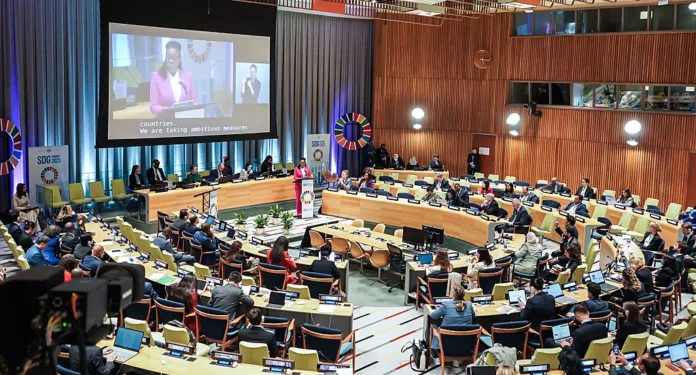Saudi Arabia leads global discussions on land restoration and climate action, paving the way for significant outcomes at COP16
Saudi Arabia has stepped into the international spotlight, leading critical environmental discussions at the 79th United Nations General Assembly (UNGA). With preparations underway for the highly anticipated COP16 climate summit, set to take place in Riyadh, the Kingdom is intensifying its efforts to tackle pressing issues such as land degradation, desertification, and drought.
At the heart of Saudi Arabia’s UNGA presence was a series of high-profile events designed to raise awareness about global environmental crises. The Kingdom’s Ministry of Environment, Water, and Agriculture, under the leadership of Osama Faqeeha, took the helm in driving these conversations. As the incoming COP16 Presidency, Saudi Arabia is determined to forge an international consensus on sustainable land management practices. Speaking at one of the key UNGA events, Faqeeha emphasised the urgency of global action: “Land degradation and drought are not just environmental problems. They are a threat to livelihoods, food security, and ultimately, the future of our planet.”
Saudi Arabia’s ambitious goals align with the UNCCD’s target to restore 1.5 billion hectares of degraded land by 2030. Through its proactive engagement, the Kingdom is positioning itself as a leader in multilateral environmental cooperation, encouraging other nations to adopt sustainable practices to combat the escalating crisis. Faqeeha further remarked, “At the UNGA, our goal was to ignite a sense of urgency and lay the foundation for COP16 in Riyadh, where we hope to deliver concrete action.”
Embed from Getty ImagesA standout event was the “Road to Riyadh” meeting, which brought together an array of stakeholders from governments, scientific communities, and non-governmental organisations (NGOs). The gathering aimed to outline a comprehensive action plan that could drive meaningful change at the December COP16 summit. The event, seen as a key precursor to the discussions in Riyadh, set the stage for what Faqeeha described as a “COP of action,” where dialogue is expected to shift towards implementation and measurable outcomes.
Adding to Saudi Arabia’s contributions to the UNGA was the launch of the pioneering “Rio Trio” initiative. This platform promotes collaboration among the three major environmental conventions: the UNCCD, focusing on land degradation; the UNFCCC, addressing climate change; and the CBD, which targets biodiversity preservation. Through this initiative, the Kingdom is striving to find unified, global solutions to these interconnected environmental challenges.
Faqeeha highlighted the significance of this dialogue, noting, “2024 could be a pivotal year for the planet, with COP16, COP29, and the biodiversity conference all taking place. It is an unparalleled opportunity for the world to come together and make lasting commitments.” The Kingdom’s leadership in advancing such dialogues underlines its commitment to fostering global cooperation and ensuring that environmental stewardship remains at the forefront of the global agenda.
This leadership is further reflected in Saudi Arabia’s ambitious domestic and international initiatives. During the G20 summit in 2020, the Kingdom introduced the Global Land Initiative, aimed at halving the world’s degraded land by 2040. This mission, aligned with Saudi Arabia’s Vision 2030 roadmap, underscores the nation’s belief that economic development and environmental conservation are not opposing forces but complementary drivers of a sustainable future.
“Our Vision 2030 plan is about more than just economic diversification,” Faqeeha explained. “It’s about embedding sustainability into everything we do, from protecting our natural resources to promoting greener business practices.” Indeed, the economic potential of land restoration is immense, with studies suggesting that restoring degraded land could generate up to $1.4 trillion annually in increased crop production.
As COP16 approaches, Saudi Arabia is working to secure enhanced global commitments. The conference, expected to draw up to 20,000 participants, will be the largest ever for the UNCCD. The event will feature the inaugural “Green Zone,” an innovative space designed for collaboration between governments, the private sector, NGOs, and financial institutions. The goal is to forge partnerships and fund sustainable solutions to land degradation, ensuring that all sectors of society are engaged in the fight against climate change.
Beyond financial mechanisms, Saudi Arabia recognises the critical role that youth and businesses play in achieving sustainable environmental outcomes. With over one billion young people in developing countries reliant on land for their livelihoods, Faqeeha stressed the importance of involving younger generations in the conversation. “Global efforts on land restoration can succeed only if we actively engage the youth,” he stated, adding that COP16 will offer platforms for young voices to advocate for sustainable land management practices.
Meanwhile, Saudi Arabia is calling on businesses to shift their mindset towards long-term sustainability. Faqeeha remarked that short-term profits have often driven companies to overlook the environmental consequences of their actions, but COP16 will focus on reversing this trend. “Investing in ecosystem restoration is not just good for the planet—it’s good for business,” he asserted. “By safeguarding natural resources, companies can ensure long-term economic security.”
With just a few months to go before COP16, the Kingdom’s leadership in environmental diplomacy continues to grow. Saudi Arabia is positioning itself not only as a regional power but as a global advocate for environmental stewardship. As the world gears up for one of the most consequential COP summits in history, all eyes will be on Riyadh to see if these ambitions translate into decisive global action.
